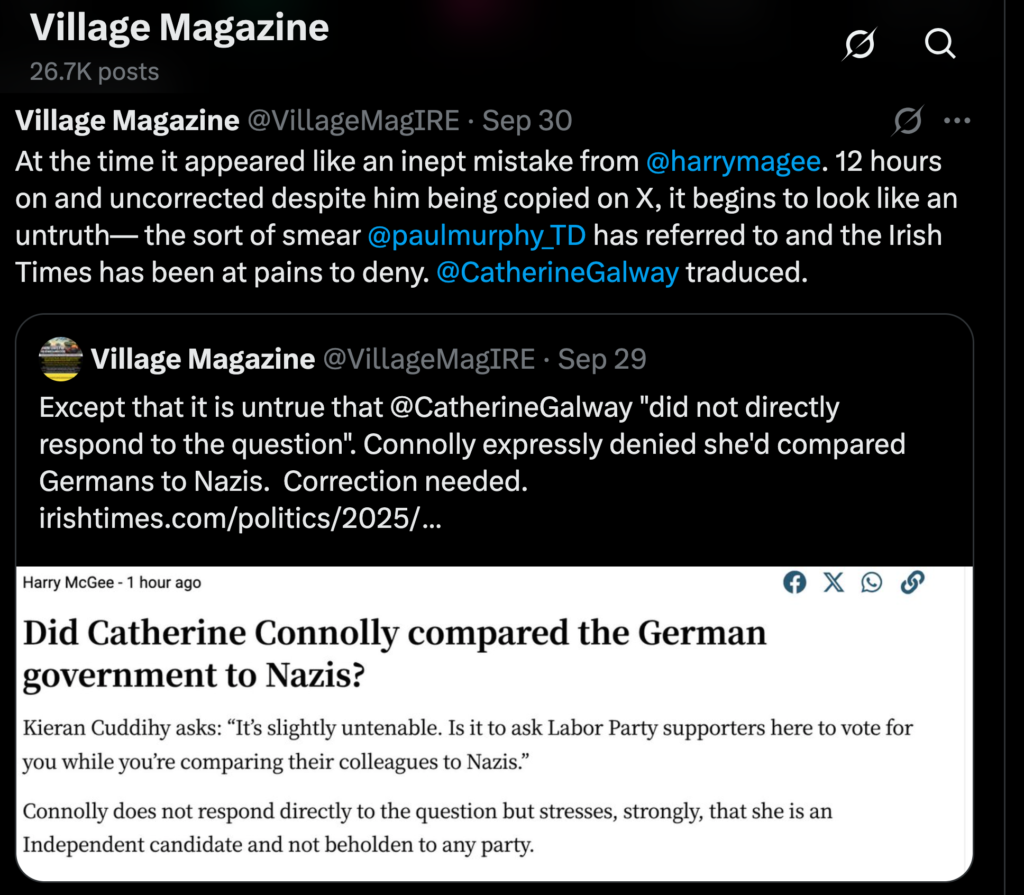By Michael Smith
If Éirígí were saying it now, the story might have some credence. They are not. Even in 2018, they absolutely did not say she was “a member”
The Irish Times’ Ursula Ní Shionnain story is not journalism. It is character assassination.
The trick turns on a single verb. In the article itself, the headline reads:
“Éirígí said Ursula Ní Shionnain still member in 2018 when employed by Catherine Connolly in Leinster House” https://www.irishtimes.com/politics/2025/10/02/eirigi-says-ursula-ni-shionnain-still-member-in-2018-when-employed-by-catherine-connolly-in-leinster-house/.
But in the social preview — the snippet readers see when they share the link — it has:
“Éirígí says Ursula Ní Shionnáin still member…”.
That one word — ‘says‘ — transforms a stale fragment into a live scandal. If Éirígí were saying it now, the story might have some credence. It might be a real thing that Ursula Ní Shionnain could agree with or deny. They are not. Even in 2018, they absolutely did not say she was “a member”. All that exists is one phrase, describing a painting by “our own Ursula Ní Shionnain.” That is Éirígí claiming her symbolically, because she had been a member who had served time. It is not evidence of membership. Yet the Irish Times translated it into “still a member” without bothering to investigate if — as a matter of fact — she indeed had still been a member and projected it in the present tense. A non-story dressed up as something, even a scandal.
The preview matters. The Irish Times boasts millions of monthly users of its stale and boring take on the world.

And it is part of a wider pattern. Consider what happened to Catherine Connolly in the presidential debate. She had been meticulous: she did not compare Germans to Nazis. She used the word parallel, not “comparison”. Even the centrists in ‘The Rest in Politics’ did a feature in the last week on Germany, which is rearming against a background where the AfD is vying for first place in the polls. She avoided the word Nazi altogether. She knows Germany: she studied the language, lived there, and points simoly to the obvious fact that Germany today is the most striking case of rapid rearmament in Europe. Careful, informed, serious.
Kieran Cuddihy’s question was loaded from the start: he asked if she was comparing the Labour Party’s German allies in the SPD to Nazis. Fair enough perhaps, Cuddihy was fairly even-handed and it was just a question.
Where it got murky was when Harry McGee reported in the Irish Times that Connolly “did not directly respond”. That was false.
Where it got murky was when Harry McGee reported in the Irish Times that Connolly “did not directly respond”. That was false. Village called it out on Twitter on 29 September:
“Except that it is untrue that @CatherineGalway ‘did not directly respond to the question’. Connolly expressly denied she’d compared Germans to Nazis. Correction needed.”
Twelve hours later, uncorrected, Village’s Twitter account sharpened the charge:
“At the time it appeared like an inept mistake … 12 hours on and uncorrected … it begins to look like an untruth — the sort of smear @paulmurphy_TD has referred to and the Irish Times has been at pains to deny. @CatherineGalway traduced”.

Two or three days later the piece was furtively changed. No acknowledgement of the mistake. No correction. Just the abject amendment.
Th pattern is obvious. In one case, the Times twists tense to make Éirígí “say” something they’re not. In the other, it has Connolly ducking a question she in fact answered directly. Both distortions serve the same function: to smear someone more radical than the unserious Irish Times, to police the boundaries of political respectability.
The Irish Times once styled itself the paper of record. It retains the smugness such a status would command but it can’t be bothered meeting the standard,. Record-keeping built on sly verbs, on false denials, on half-truths repeated until they pass for fact — that is not even journalism.
It is, when in campaign mood, a paper of smear. A paper of tense little lies. Biased.